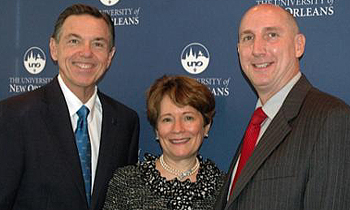Nice Above Fold - Page 500
University regents call time-out on KUT signal expansion
One of public radio’s biggest split-format stations, Austin’s KUT, is pursuing a signal expansion that follows a familiar playbook for strengthening audience service: buying a new channel to air music while dedicating its flagship signal to news programming. But for this station serving a city that makes weirdness a point of civic pride, there’s a distinct difference to its ambitions to become a dual-station operator. It will put rock and alternative music, not classical, on its new signal; 90.7 MHz, the FM channel that has served KUT’s news and music audiences for decades, will go all-news. That’s if and when the University of Texas Board of Regents, the governing board of KUT’s licensee, approves the proposed $6 million purchase of 98.9 MHz, a commercial frequency that’s now broadcasting classic rock hits under the call letters KXBT.Aronson promoted at Frontline, NPR Board elections, Lapin joins Current, and more...
The promotion, announced during the Television Critics Association Press Tour last month, was widely reported as an indication that Aronson will succeed founding Executive Producer David Fanning atop PBS’s investigative news centerpiece.WWNO, NPR plan expanded newsroom to serve New Orleans
A group of public radio partners is preparing to launch a new local journalism nonprofit that will employ upwards of 20 people in a hybrid digital/broadcast newsroom.
Thicket of uncertainty for federal aid
Public broadcasters face multiple and serious uncertainties on Capitol Hill over the next few months. A spending bill approved by the House subcommittee with oversight of CPB’s appropriation proposes to phase out CPB funding over the next three years; it includes language restricting public radio stations from spending their CPB aid to support NPR in any way. Another election-season threat comes from GOP presidential hopeful Mitt Romney, who has repeatedly cited CPB as one of five agencies he’d extinguish. Sequestration, a byproduct of Congress’s inability to reach consensus on debt-reduction measures last summer, could also hit pubcasting, slicing 8 percent or more from the $445 million in federal funding that pubcasters anticipate for 2013.Daisey, onstage and off air, revives his 'Agony and Ecstasy'
“There is no objective, journalistic version of the show,” Daisey said. “I will be, always, making constant lies of omission by leaving out tons and tons and reams and reams of details."WNET to share content with city's NYC Media
WNET in New York City is collaborating with NYC Media, part of the Mayor’s Office of Media and Entertainment, to share content “highlighting different aspects of the city,” the two said in a press release. The partnership “allows us to mine our incredible archives for new platforms,” said Neal Shapiro, WNET president. First up, the NYC life channel will broadcast episodes of WNET’s Treasures of New York and MetroFocus, and WNET and WLIW will run NYC life’s special about city parks.
Birmingham News calls on Alabama governor to investigate upheaval at APT
In an editorial today, the Birmingham News is asking Alabama Gov. Robert Bentley and legislative leaders to “get to the root cause” of the “continuing upheaval” at Alabama Public Television. “APT and its educational and informative programming are too important to the state not to warrant an investigation into what is going on with the commission that oversees it,” the editorial board wrote Monday. The sudden termination on June 12 of APT Executive Director Allan Pizzato and his deputy, Pauline Howland, by the Alabama Educational Television Commission threw the state network into chaos. Within days, nine members of two fundraising boards resigned in protest; the station’s longtime chief operating officer, Charles Grantham, also just resigned, effective Aug.Pledge Pipeline 2012-13
Current’s Pledge Pipeline previews 17 shows heading to public TV on-air membership drives in December 2012 and March 2013.CPB grants NPR $1.5 million for diversity initiative
CPB is providing a $1.5 million grant to NPR to increase the diversity of its journalism ranks. The announcement of the two-year grant came on Aug. 2 the UNITY 2012 Convention in Las Vegas, an annual gathering of media professionals. The funding will help NPR create a diverse team of reporters and editors guided by a senior online journalist overseeing the creation and curation of original, multiplatform content daily. The team will provide coverage of local communities nationwide, the issues that affect them and the people of many backgrounds and opinions who make those communities unique. CPB said this grant builds on the success of the CPB/Knight Foundation-funded Project Argo, which helped NPR serve new broadcast and online audiences by focusing on specific subject areas.FCC denies petition challenging license renewal of WCQS-FM
The FCC has dismissed a challenge to license renewal for WCQS-FM in Asheville, N.C., reports the local Citizen-Times. The petition was brought late last year by a group headed by retired pubradio exec and producer Fred Flaxman. He said that he had volunteered to serve on the station’s community advisory board but learned that it didn’t have one, a violation of the Public Broadcasting Act. Once station management did establish a board, it was “tightly controlled to make sure that no critics of the station or its policies are allowed to serve,” Flaxman contended. He also complained in the petition that WCQS didn’t carry programs by local independent producers, including himself.Minnesota public-access TV studio for five communities closing soon
A Minnesota public-access TV studio serving five cities will shut down this month, “an example of accessible, hyper-local television being forced to refocus in an era of instant, free video uploads to YouTube and Facebook,” reports the Star Tribune. Comcast no longer wants to run the studio, and the Southwest Suburban Cable Commission says equipment needs updating and the facility produces too few programs for Edina, Eden Prairie, Hopkins, Minnetonka and Richfield. “You need a studio that provides gravitas for the cancer survivor, the politician, the minority group,” Jeff Strate, who has produced a show at the studio, told the newspaper.Center for Investigative Reporting launches "I Files" YouTube channel
The Berkeley, Calif.-based Center for Investigative Reporting unveiled its new YouTube channel, The I Files, today. The channel, funded by the Knight Foundation, will be curated by CIR and will repost investigative-reporting videos from a wide assortment of content partners. Among the partners is the Investigative News Network, a consortium of 60 nonprofit news organizations that includes American University’s Investigative Reporting Workshop and the Pulitzer Center on Crisis Reporting. Among CIR’s for-profit partners: The BBC, ABC News, The New York Times and Al Jazeera. The channel will include videos from freelance journalists as well. The I Files launched with ten videos, including two original pieces of reporting from CIR: a look at the woman who provided court testimony that brought the murderer of journalist Chauncey Bailey to justice, and an animated exploration of hamburger production.ProPublica partners with The News Outlet to educate journalism students in northeast Ohio
Nonprofit investigative-journalism organization ProPublica announced Tuesday a new partnership with The News Outlet, an community-journalism nonprofit based in northeast Ohio. The initiative, which The News Outlet detailed on its website, is an investigative-reporting workshop for journalism students at Youngstown State University, which founded The News Outlet and operates the website from its campus. The partnership, billed as a pilot project, adds a component to an advanced reporting course in YSU’s journalism school. Students will report and produce investigative stories under the guidance of ProPublica managing editor Stephen Engelberg. Engelberg will visit the campus for the first week of the class, then join the class weekly via Skype.A letter from the editors
We’ve been preparing for months to bring you a new, improved web service, one that highlights more of our news coverage and analysis of the evolving world of public media.Exclusive interview: Alabama Public Television COO Grantham resigns
Charles Grantham, chief operating officer of Alabama Public Television, has resigned, effective Aug. 31. Grantham told Current that the “additional stress and frustrations” at the station in the wake of the controversial terminations in June of Executive Director Allan Pizzato and his deputy, Pauline Howland, have taken a toll on him. Since the firings by the Alabama Educational Television Commission, Grantham had been publicly voicing his concerns about the future of the station. “I’m glad I’ve been able to be a spokesman and make some of the staff feelings known to the commission and others during all this turmoil,” he said.
Featured Jobs







